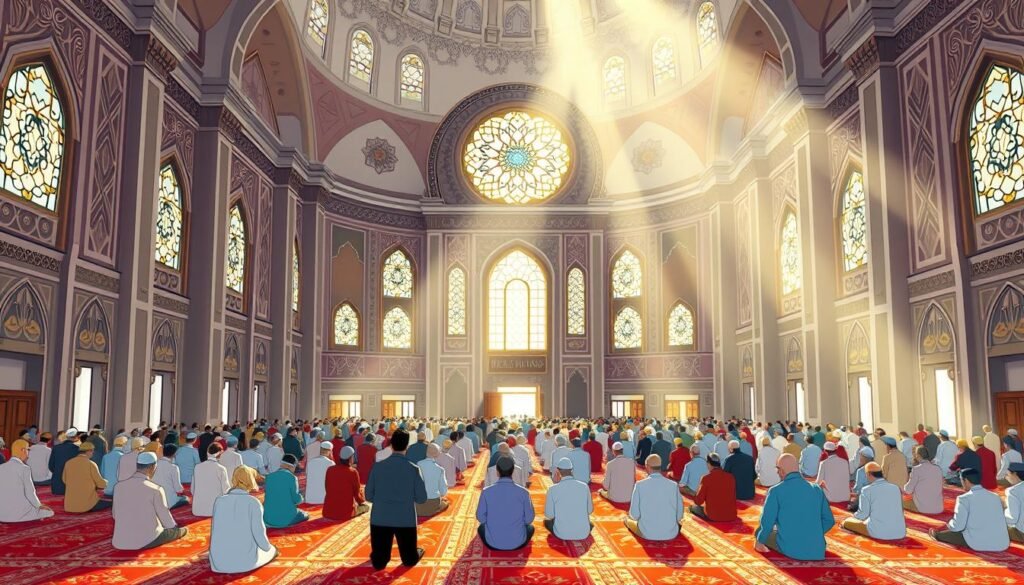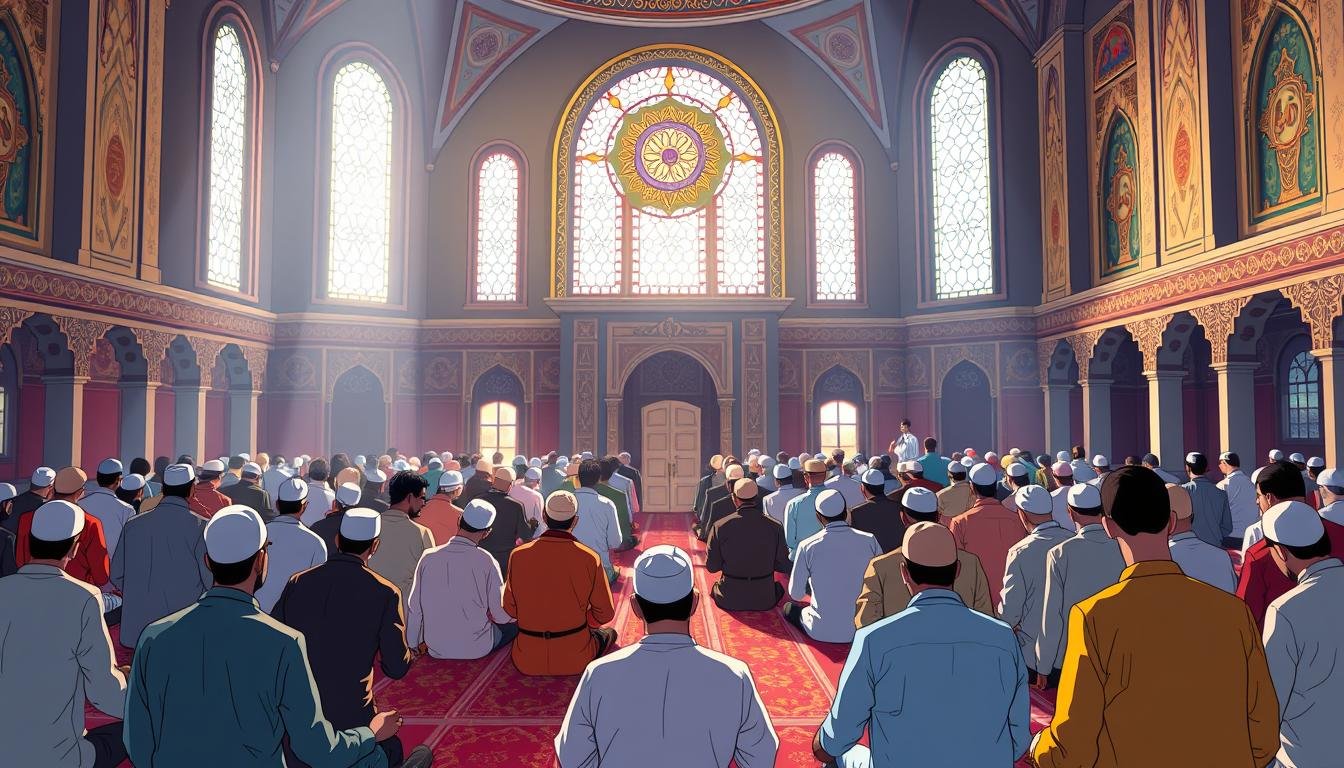Have you ever wondered why different faiths have their sabbath on different days? This shapes their spiritual and community lives. For Muslims, Friday is the Muslim Sabbath, known as Jumu’ah, which means “the day of gathering.”
This day is very important in Islamic worship. It’s when Muslims come together for Friday prayer. This shows their devotion and unity. The Quran says it’s a day to stop trading and pray together, creating a strong spiritual bond.
In contrast, Judaism’s Sabbath is from Friday evening to Saturday evening. Many Christians celebrate on Sunday. But the Muslim Sabbath is special for coming together and worshiping. We will explore why Jumu’ah is so important in Islam.
The Significance of the Muslim Sabbath
Friday is more than just a day in Islamic tradition. It’s a time for everyone to come together for prayer and reflection. The Quran says Friday is special, encouraging people to join in prayer at mosques.
Chapter 62 of the Quran talks about the importance of these gatherings. It shows how Friday helps people connect with Allah.
Understanding the Day of Prayer
The Quran makes it clear why Friday is important. It tells us to stop our work and pray together. This shows Friday is a day for spiritual growth, not just work.
The Prophet Muhammad also talked about Friday’s importance. He said it’s the day Adam was made and when prayers are especially powerful. This makes Friday a special day in Islamic tradition.
Importance of Friday in Islam
Friday is a key part of Islamic worship. It’s different from the Jewish Sabbath, which is on Saturday. The Quran says Friday is the day for prayer, not rest.
This shows God doesn’t need rest, as the Quran says in Chapter 2, verse 255. So, Friday is a day for people to come together and thank God. It’s a time for reflection and strengthening community bonds.
When Is The Muslim Sabbath?
The Muslim Sabbath is on Friday. It’s a day full of meaning in the Islamic faith. Believers come together for Jumu’ah, a special prayer at noon.
This day is more than a ritual. It’s a time for unity, reflection, and bonding. It makes Friday a Holy Day for Muslims everywhere.
The Observance of Friday as a Holy Day
Friday starts at dawn and is special in Islam. It’s different from other religions’ Sabbath days. For example, Christians rest on Sunday to celebrate Jesus’ resurrection.
Jews rest from Friday sundown to Saturday sundown. This shows Friday’s unique role in Islam. It’s a day for everyone to pray together at the mosque.
Comparison with Jewish and Christian Sabbaths
Looking at the Islamic Sabbath comparison with others shows both similarities and differences. While others rest and reflect, Jumu’ah is active. Muslims pray, listen to sermons, and do good deeds like giving zakat.
This shows the importance of community and helping others. It makes Friday a day of charity and shared beliefs.
The Concept of Jumu’ah in Islam
The Jumu’ah prayer is a key part of Islamic life. It brings Muslims together every Friday. This ritual shows the value of community and worship.
It creates a space for unity and spiritual growth. People come together to reflect and seek enlightenment.
Friday Congregational Prayer
During Jumu’ah, every action holds deep meaning. The group starts with ritual washing, showing the importance of purity.
Then, different voices come together in chants and readings. The sermon, or khutbah, is a highlight. It calls everyone to remember God and seek blessings.
Men are expected to go to the mosque. Women and children are welcome too, making it inclusive.
Unique Rituals Associated with Jumu’ah
The Jumu’ah prayer is special, with its own set of rituals. It’s shorter than the regular Zuhr prayer. It has two Rak’ahs after the sermon, making it unique.
There are differences in Sunni and Shiite traditions. These variations add depth to the practice. Hadith teachings highlight the extra blessings and forgiveness it brings.

The Five Pillars of Islam and Their Relation to the Sabbath
The Five Pillars of Islam are key practices in the Muslim faith. Prayer and charity are especially important on the Muslim Sabbath. Fridays are a special day for Muslims to come together for worship and reflection.
This day is not just for prayer. It also highlights the importance of charity in Islam.
Connection Between Prayer and the Sabbath
Prayer connects the worshipper directly with God. On Fridays, Muslims gather for congregational prayers. This is a time to fulfill their spiritual duties.
The call to prayer, or Adhan, reminds everyone of the importance of these gatherings. It brings the community together in unity.
Role of Charity on the Day of Worship
On Fridays, Muslims think about the value of charity. Zakat, a key pillar, is at the heart of their Sabbath observance. This annual donation is 2.5% of one’s net assets.
Giving is more than a duty; it shows faith and commitment to fairness in the Muslim world. By praying and giving on this day, Muslims show their spiritual and ethical sides.
Historical Context of the Muslim Sabbath
Looking into the Muslim Sabbath’s history shows how practices and beliefs merged. This rich mix shows how Islamic worship grew, meeting the spiritual needs of Muslims while honoring their past. Friday became a special day for worship, changing how people came together to pray.
Development of Islamic Worship Practices
Islamic worship practices took a unique path, different from before. Friday became the main day for public prayer, showing unity among Muslims. This choice also fit with Medina’s market day, blending social and religious life.
Today, Friday prayers are key to Islamic worship. They show how these practices evolved, setting them apart from other faiths.
Evolution from Earlier Abrahamic Religions
The move from earlier Abrahamic religions is key to understanding Islamic worship. Unlike Judaism and Christianity, Islam chose Friday for its Sabbath. This choice was influenced by the culture of the time.
Using market days for worship and gatherings shows the mix of history and faith in Islam. These changes show Islam’s unique path among Abrahamic faiths.
Similarities Between Muslim and Jewish Customs
Both Muslims and Jews have special days for rest. These days help people connect with their faith and community. It’s a time to reflect and pray, showing respect for peace and gratitude.
Rest and Abstinence from Work
In Islam, Friday prayers mean stopping work. This shared value shows respect for the divine. Jewish people also stop work on the Sabbath, from Friday evening to Saturday evening.
Common Themes of Reflection and Gratitude
Both faiths value moments of reflection and thanks. These days strengthen community bonds. They encourage people to share and give, showing the common values between religions.
The Role of Community in Friday Prayers
Friday prayers, or Jumu’ah, bring people together who share faith. This gathering strengthens the bond of community in prayer. It allows Muslims to connect spiritually and build important social ties.
Attending the weekly service is a chance for members to unite. They come together in a space for worship, camaraderie, and support.
Building Bonds Through Worship
The mosque becomes a center of social interaction during Jumu’ah. Every Friday, Muslims come together for a 40-minute sermon and prayer. The atmosphere is filled with love and brotherhood.
Historically, communities like those in Seattle have grown from humble beginnings. They now celebrate diverse cultures through their attire. This shows the rich diversity of the Muslim identity in the United States.
Impact on Social and Spiritual Life
Jumu’ah has a big impact beyond just attending. It creates a supportive environment for sharing experiences and building relationships. This connection fosters unity and a shared spiritual commitment.
Together, they pray for peace and guidance. This makes the Islamic experience more meaningful and connected.
Spiritual Benefits of Observing the Muslim Sabbath
Observing Jumu’ah brings many spiritual benefits. It deeply affects both personal and community life. Every Friday, Muslims gather for prayer, strengthening their faith together.
This gathering is key for personal growth and spiritual connection. People reflect on their lives and seek to bond closer with Allah.
Enhancing Personal Faith and Commitment
Jumu’ah’s spiritual benefits go beyond just showing up. It makes people feel part of a faith community. This feeling strengthens their commitment to Islamic values.
Those who attend find new energy. The shared experience boosts their faith and spiritual understanding. It also builds resilience as believers support each other.
Promoting Peace and Reflection
Friday prayers offer a peaceful space for reflection. It’s a time to step back from daily chaos and think deeply. The calm of the mosque helps people focus on life’s blessings.
This reflection brings inner peace. It’s crucial for both personal and community well-being. It helps maintain spiritual health and promotes community welfare.
Challenges Faced During the Observance of the Muslim Sabbath
Keeping the Muslim Sabbath, or Jumu’ah, is very important. But, many people face challenges in observance. A big problem is finding a good work-life balance.
In today’s fast world, going to Jumu’ah can clash with work. This is especially hard for those with tight schedules. Many Muslims struggle to balance their religious duties and job needs.
Balancing Work and Worship
Friday prayers are meant to bring people together and deepen devotion. But, real-life issues make it hard to fully participate. Many feel forced to pick work over worship, leading to a spiritual gap.
It’s key to understand these issues to find ways for people to meet their duties and faith.
Cultural Differences in Observance
The way Muslims keep Jumu’ah varies a lot because of cultural differences. Some follow it very strictly, while others are more flexible. Knowing these differences helps us understand each other better.

These issues remind us of problems in many faiths. They bring to mind old debates about weekly rest, like this article on Sabbath practices. Seeing how work and culture affect us helps us find ways to stay connected spiritually in today’s world.
Future of Islamic Sabbath Observance
The future of Muslim Sabbath observance is exciting. It will blend old traditions with new ways. This mix will help us keep Jumu’ah meaningful in today’s world.
Technology is changing how we live and pray. It can make our Jumu’ah practices better. This way, we can stay connected to our faith and community.
The Sabbath is very important in Islam. The Qur’an warns us about disrespecting it. Surah Al-Jumu’ah tells us to pray together on Fridays.
We must keep the Sabbath’s spirit alive. But, we also need to adapt to today’s fast pace. This balance is key.
Our communities must protect Jumu’ah’s sacredness. Talking openly about its future helps us find new ways to honor it. By learning from the past, we can keep the Sabbath alive and meaningful.
FAQ
When is the Muslim Sabbath observed?
Why is Friday significant in Islam?
How does the observance of Jumu’ah compare to Jewish and Christian Sabbaths?
What is the essence of the Jumu’ah prayer?
How does the Five Pillars of Islam connect to the Muslim Sabbath?
What is the historical context of the Muslim Sabbath?
Are there similarities between Muslim and Jewish customs regarding the Sabbath?
What role does community play during Friday prayers?
What spiritual benefits does observing the Muslim Sabbath provide?
What challenges do Muslims face in observing the Muslim Sabbath today?
What does the future of Islamic Sabbath observance look like?

Embracing Faith, One Insight at a Time!
The teachings of the Quran have always guided my path. With a deep passion for Islamic knowledge, I strive to blend the wisdom of tradition with the relevance of today, making the timeless messages of Islam accessible and meaningful for everyone.
Muslim Culture Hub is my platform to share historical insights and thought-provoking articles, exploring both well-known and lesser-discussed aspects of Islamic culture and beliefs. My mission is to create an inclusive online space where everyone can learn, strengthen their faith, and connect with the profound message of Islam.
Join the journey!
May peace be upon you.








